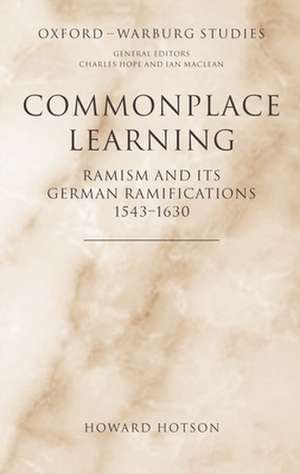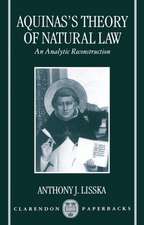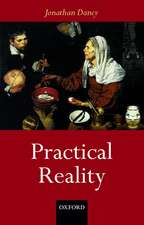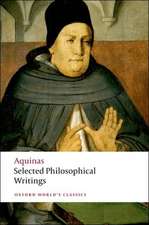Commonplace Learning: Ramism and its German Ramifications, 1543-1630: Oxford-Warburg Studies
Autor Howard Hotsonen Limba Engleză Hardback – 25 ian 2007
Din seria Oxford-Warburg Studies
- 30%
 Preț: 583.19 lei
Preț: 583.19 lei - 12%
 Preț: 618.52 lei
Preț: 618.52 lei - 15%
 Preț: 279.41 lei
Preț: 279.41 lei - 30%
 Preț: 725.13 lei
Preț: 725.13 lei - 28%
 Preț: 474.54 lei
Preț: 474.54 lei - 30%
 Preț: 595.78 lei
Preț: 595.78 lei - 30%
 Preț: 553.04 lei
Preț: 553.04 lei - 34%
 Preț: 1329.49 lei
Preț: 1329.49 lei - 34%
 Preț: 583.23 lei
Preț: 583.23 lei - 34%
 Preț: 1012.42 lei
Preț: 1012.42 lei - 34%
 Preț: 1543.33 lei
Preț: 1543.33 lei - 34%
 Preț: 1594.22 lei
Preț: 1594.22 lei - 31%
 Preț: 1358.70 lei
Preț: 1358.70 lei - 34%
 Preț: 1465.95 lei
Preț: 1465.95 lei - 18%
 Preț: 327.50 lei
Preț: 327.50 lei - 34%
 Preț: 1084.92 lei
Preț: 1084.92 lei - 34%
 Preț: 1924.25 lei
Preț: 1924.25 lei - 31%
 Preț: 371.09 lei
Preț: 371.09 lei - 34%
 Preț: 999.19 lei
Preț: 999.19 lei - 31%
 Preț: 1172.72 lei
Preț: 1172.72 lei - 14%
 Preț: 321.38 lei
Preț: 321.38 lei -
 Preț: 327.73 lei
Preț: 327.73 lei - 30%
 Preț: 612.62 lei
Preț: 612.62 lei - 30%
 Preț: 547.52 lei
Preț: 547.52 lei - 30%
 Preț: 703.92 lei
Preț: 703.92 lei - 12%
 Preț: 733.56 lei
Preț: 733.56 lei
Preț: 1504.71 lei
Preț vechi: 2292.99 lei
-34% Nou
Puncte Express: 2257
Preț estimativ în valută:
287.96€ • 312.68$ • 241.89£
287.96€ • 312.68$ • 241.89£
Carte tipărită la comandă
Livrare economică 11-17 aprilie
Preluare comenzi: 021 569.72.76
Specificații
ISBN-13: 9780198174301
ISBN-10: 0198174306
Pagini: 360
Ilustrații: 10 charts and maps
Dimensiuni: 146 x 223 x 26 mm
Greutate: 0.54 kg
Editura: OUP OXFORD
Colecția OUP Oxford
Seria Oxford-Warburg Studies
Locul publicării:Oxford, United Kingdom
ISBN-10: 0198174306
Pagini: 360
Ilustrații: 10 charts and maps
Dimensiuni: 146 x 223 x 26 mm
Greutate: 0.54 kg
Editura: OUP OXFORD
Colecția OUP Oxford
Seria Oxford-Warburg Studies
Locul publicării:Oxford, United Kingdom
Recenzii
Brilliantly written, perfectly constructed, Hotson's work reads like a novel...a rich and convincing panorama which will serve from this point onward as an indispensable landmark for all future research in a particularly elusive and complex field of study
This volume is a fine study of Ramism in German lands, and it offers a sound argument for the popularity and impact of Ramus.
The virtues of Hotson's work are many. It negotiates the difficult challenge of writing prose that accommodates the detail necessary to recreate the intellectual, social and political elements involved in his story while at the same time producing a clear and intelligible text. The argument he develops in the course of the work is entirely convincing, and gains for his work the distinction of being the preeminent study of the topic, putting to rest Ongs interpretations of Ramism's appeal and spread. Those who study the intellectual life of this era will need to take Hotsons work into account
This is a densely learned and really valuable study, which combines scholarship on areas including the history of early modern universities, late renaissance Aristotelianism and the philosophical textbook tradition with impressive, polyglot linguistic skill and strong sympathy for the importance of Ramism and encyclopaedism as significant intellectual traditions. Consequently, it contains much that will be of great interest to historians of universities and to those working on many other areas of intellectual history.
In Commonplace Learning Howard Hotson puts the case for Ramism. He does so with immense knowledge, and his enthralling reconstruction of the history of the movement is totally convincing... Commonplace Learning is an altogether exceptional achievement. Besides being stimulating and highly informative, it is an immense pleasure to read.
Commonplace Learning is certainly a valuable addition to the history of the Ramist movement in central Europe because it is one of the first to provide a detailed account of Ramism within a national context. Taking a page from Ramus' book, Hotson's work tackles a difficult topic in an orderly and methodical fashion, simplifying Ramism for a new generation of scholars.
Howard Hotson has succeeded in portraying a nuanced and exceptionally clear image of an important educational movement of great significance for the cultural history of the western world.
Ramus sought to instruct clearly and efficiently, and he would have appreciated Hotson's clear prose and well organized presentation. Hotson succeeds in bringing together an impressive array of sources, including manuscripts and printed texts from across Europe, and in showing that they can all be seen as part of a broad debate about human knowledge. Commonplace Learning is indispensable for understanding Reformed theology and education of the early seventeenth century.
This volume is a fine study of Ramism in German lands, and it offers a sound argument for the popularity and impact of Ramus.
The virtues of Hotson's work are many. It negotiates the difficult challenge of writing prose that accommodates the detail necessary to recreate the intellectual, social and political elements involved in his story while at the same time producing a clear and intelligible text. The argument he develops in the course of the work is entirely convincing, and gains for his work the distinction of being the preeminent study of the topic, putting to rest Ongs interpretations of Ramism's appeal and spread. Those who study the intellectual life of this era will need to take Hotsons work into account
This is a densely learned and really valuable study, which combines scholarship on areas including the history of early modern universities, late renaissance Aristotelianism and the philosophical textbook tradition with impressive, polyglot linguistic skill and strong sympathy for the importance of Ramism and encyclopaedism as significant intellectual traditions. Consequently, it contains much that will be of great interest to historians of universities and to those working on many other areas of intellectual history.
In Commonplace Learning Howard Hotson puts the case for Ramism. He does so with immense knowledge, and his enthralling reconstruction of the history of the movement is totally convincing... Commonplace Learning is an altogether exceptional achievement. Besides being stimulating and highly informative, it is an immense pleasure to read.
Commonplace Learning is certainly a valuable addition to the history of the Ramist movement in central Europe because it is one of the first to provide a detailed account of Ramism within a national context. Taking a page from Ramus' book, Hotson's work tackles a difficult topic in an orderly and methodical fashion, simplifying Ramism for a new generation of scholars.
Howard Hotson has succeeded in portraying a nuanced and exceptionally clear image of an important educational movement of great significance for the cultural history of the western world.
Ramus sought to instruct clearly and efficiently, and he would have appreciated Hotson's clear prose and well organized presentation. Hotson succeeds in bringing together an impressive array of sources, including manuscripts and printed texts from across Europe, and in showing that they can all be seen as part of a broad debate about human knowledge. Commonplace Learning is indispensable for understanding Reformed theology and education of the early seventeenth century.
Notă biografică
Dr Hotson works in the field of early modern European intellectual history, with particular attention to central Europe and the international Reformed world c.1550-1660. Thematically, he has written on the histories of science, philosophy, religion, education, and political theory and their relationship to broader social, political, and confessional developments. At the heart of his interests are the gradually expanding reform movements of the post-Reformation period culminating in the pansophism of Comenius, the universal reform programme of Samuel Hartlib, and the audacious philosophical projects of Leibnitz. Oxford University Press published his book on Alsted in 2000: Johann Heinrich Alsted 1588-1638: Between Renaissance, Reformation and Universal Reform: it received a wide range of excellent reviews.















